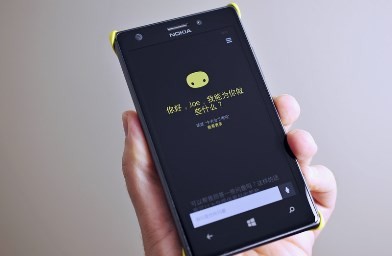Microsoft Corp. has relaunched the chatbot service Xiaoice on Aug. 20 through Tencent Holdings' mobile messaging app WeChat, more than one year after WeChat blocked the service, the Global Times reported.
During the relaunch, Microsoft engineers also showcased Xiaoice's latest features, in which WeChat users can add Xiaoice's public account as their friend and converse with the chatbot. The chatbot now cannot only respond to text messages, but can also identify and respond to pictures and voice messages sent by WeChat users.
According to the report, the artificial intelligence chatbot can identify what it is in a picture, as well as use emotions more effectively than similar other products, such as guessing the relationships of the people in a picture or knowing if someone has a new haircut.
On May 29, 2014, Microsoft launched the Xiaoice service through the WeChat platform and attracted tens of millions of users in several days.
WeChat, however, removed a number of chatbots on its platform on June 1, 2014, for alleged violation of WeChat's regulations that threaten users' privacy.
Microsoft said on Aug. 20 that only a limited number of WeChat users can use the latest version of Xiaoice to ensure "the orderly development" of the service.
A statement released by Tencent on Aug. 20 said that the cooperation will create more value for WeChat users, as Xiaoice's user experience has rapidly improved in the past year.
Analysts said that Microsoft's alliance with WeChat has helped quickly expand the user base of Xiaoice, which now had 600 million monthly active users as of June.
"Xiaoice's commercial value is the users' data it has access to," Ding Daoshi, deputy managing editor of IT website sootoo.com, told the Global Times.
The report said that users can also access Xiaoice on Microsoft's Windows 10 platform, as well as social networking platform Weibo, e-commerce platform JD.com and news portal 163.com.
In China and Japan, Microsoft's chatbots have 40 million users, the report added.
In Japan, Microsoft launched the service with mobile messaging app Line on Aug. 7 and named the chatbot Rinna.
Lu Qi, executive vice president of Microsoft's applications and services group, also told media during the event that Microsoft is also developing an English-language version of the chatbot.
"Xiaoice is an important part of Microsoft's artificial intelligence strategy," Lu said.
As Microsoft also aims to commercialize the chatbot service, Lu said that businesses were allowed to connect their WeChat accounts to Xiaoice so that they can avail Microsoft's technologies to communicate with their subscribers. The enterprises will not be charged any fees by Microsoft, he added.
The report said that Microsoft's latest move shows it efforts to regain position in the mobile Internet arena.
"Microsoft has lagged behind other tech giants in the mobile Internet era, and it wants to release some innovative products to attract users," Li Yi, secretary-general of the China Mobile Internet Industry Alliance, said.
Google and Apple Inc. have launched similar artificial intelligence features--Google Now and Siri, respectively--for mobile devices.



























